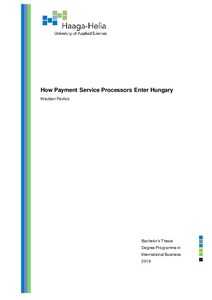How Payment Service Processors Enter Hungary
Pavlics, Krisztian (2019)
Pavlics, Krisztian
2019
All rights reserved. This publication is copyrighted. You may download, display and print it for Your own personal use. Commercial use is prohibited.
Julkaisun pysyvä osoite on
https://urn.fi/URN:NBN:fi:amk-2019120525052
https://urn.fi/URN:NBN:fi:amk-2019120525052
Tiivistelmä
The global financial world is on the edge of a wide transformation in order to deliver faster, more secure and overall better services to customers. The European Union is enhancing this transition through a well thought set of rules in order to maintain stability and agreement between the participant countries and to grow EU-inland financial entities as whole, therefore setting such regulations for open banking as the Payment Services Directive (PSD and PSD2 – a revised version of the older directive), which allows third parties to intervene in the service chain and provide a variety of banking solutions to banks and their customers.
The thesis is a research-based analysis focusing on the key indicators from the perspective of a Payment Service Processor (PSP) when entering a new market. Identifies the foundations of a theory which makes the reader understand the basis on which an investment of a PSP is valid or rejected.
Hungary is one of the fastest developing countries within the European Union. The transition from cash to e-solutions and most importantly to banking is significant. Therefore, the thesis focuses on this country as whole as it possesses a rich customer base and an outdated infrastructure which third party service providers can stabilize and develop quickly. Besides pricing, the research focuses on the biggest banks in the region, considering customer base, which is the income accelerator of PSPs and the maturity of digital based payments to understand, compared to other countries, where these countries stand on the long run service implementations.
The outcome of the thesis gives a clear understanding for the commissioning company whether the expansion should be taken into consideration and if so, what the numbers are on which the pricing can be done.
The thesis is a research-based analysis focusing on the key indicators from the perspective of a Payment Service Processor (PSP) when entering a new market. Identifies the foundations of a theory which makes the reader understand the basis on which an investment of a PSP is valid or rejected.
Hungary is one of the fastest developing countries within the European Union. The transition from cash to e-solutions and most importantly to banking is significant. Therefore, the thesis focuses on this country as whole as it possesses a rich customer base and an outdated infrastructure which third party service providers can stabilize and develop quickly. Besides pricing, the research focuses on the biggest banks in the region, considering customer base, which is the income accelerator of PSPs and the maturity of digital based payments to understand, compared to other countries, where these countries stand on the long run service implementations.
The outcome of the thesis gives a clear understanding for the commissioning company whether the expansion should be taken into consideration and if so, what the numbers are on which the pricing can be done.
